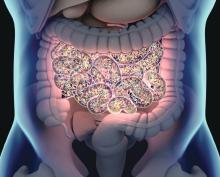The success of fecal microbiota transplantation (FMT) in people with active ulcerative colitis (UC) was not improved by using highly standardized and controlled “superdonor” samples versus control samples, according to results reported at the 17th congress of the European Crohn’s and Colitis Organisation.
Indeed, a similar percentage (10% and 13.9%, respectively; P = .72) of patients achieved combined steroid-free endoscopic and clinical remission at 8 weeks, which was the primary endpoint of the randomized, controlled, RESTORE-UC trial.
“Maybe we were too bold to say we will go for steroid-free endoscopic remission and response,” said Clara Caenepeel, MD, who was the presenting study investigator. “It’s a very strict endpoint.”
The reasoning for such a strict endpoint, however, was so that the trials’ findings could be compared with some of the other studies that have been done with FMT in UC. Importantly, all those trials have all been positive, making the results of the RESTORE-UC trial at odds with their findings.
“I think in the analysis that we will do now is definitely look at how many steps we went into the right direction,” noted Dr. Caenepeel, who is a doctoral researcher at IBD Leuven (Belgium).
Response to results
Although this is a negative trial, its findings are still important for future work looking at the role of FMT in managing patients with inflammatory bowel disease and identifying the best donor material and ways to deliver it.
While some have suggested it was back to the bench to explore negative results, others such as Michael A. Kamm, MBBS, MD, FRCP, FRACP, congratulated the investigators for undertaking the study, saying that “these studies are very hard to do!”
Dr. Kamm, who is professor of gastroenterology and leads the Kamm Gut Research Group at the University of Melbourne, was part of the Australian team that conducted the FOCUS (Faecal Microbiota Transplantation in Ulcerative Colitis) study. That study used the same primary endpoint of steroid-free endoscopic and clinical remission at 8 weeks but reported positive results – 27% of patients who had FMT versus just 8% of those who had a saline enema as a placebo achieved the endpoint (P = .021). Similarly positive findings have also been reported from five other studies.
“To understand why [RESTORE-UC] study is negative, coming after several positive studies, one needs to explore the differences in study design,” Dr. Kamm observed in an interview. Those differences include how donors were selected, how the FMT was delivered, and how patients were selected.
“All the early studies made no presumption about a favorable donor profile,” Dr. Kamm noted with regard to the selection of donors based on their microbial profile. Moreover “the mode of delivery – sigmoidoscopy without any colonoscopic whole-colon delivery, in contrast to previous studies – as well as patient selection, [with] no information on the anatomical extent of their disease,” could be important.
“There are enough robust positive studies of FMT in ulcerative colitis to believe that this therapy can be effective,” said Dr. Kamm. “Analysis of negative studies like this one should help us to understand what factors are needed to achieve a positive outcome.”


